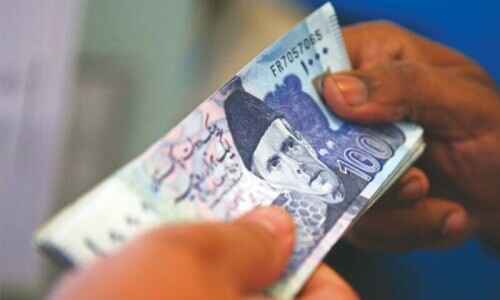KARACHI: In the first 11 months of the current fiscal year, the government has borrowed more money than it did in the two years prior combined.
This massive bank borrowing was done at a historically high interest rate of 22%, which suggests that the amount of debt payment will significantly increase and surpass the budgetary projections for the next fiscal year.
The government borrowed Rs7.39 trillion between July 20, 23 and June 7, 2024, according to SBP data. There are still 23 borrowing days that need to be recorded.
This exceeded the total borrowings by the government in FY23 and FY22, which is indicative of the high spending during the last fiscal year even if the development budget was cut to cover other costs.
Compared to Rs7.389tr in 11MFY24, the government borrowed Rs3.72tr in FY23 and Rs3.49tr in FY22, for a total of Rs7.16tr.
According to bankers, by June 30th, the overall borrowing for FY24 would reach Rs8 trillion. The government’s enormous borrowing virtually prevents it from allocating funds for development initiatives; instead, it uses all of its tax revenue to pay down its debt.
The government will spend Rs7.21tr on servicing domestic debt and an additional Rs1.04tr on servicing foreign debt, for a total of Rs8.25tr, according to the budget document for the upcoming FY2023–24.
The government has set aside Rs1.04tr for international debt service and Rs8.736tr for domestic debt servicing in the next FY25, a total of Rs9.77tr.
According to government estimates, revenue generation increased by 30 percent in FY24 and is expected to climb by 40 percent in the next fiscal year.
Experts in the economy predict that, having already failed to meet the FY24 objective of Rs9.41 trillion in tax revenue, the government will fail to meet the FY25 aim of Rs12.97 trillion. But since debt servicing will increase, the incoming government’s large borrowing may be the biggest obstacle to growth.
A banker stated, “The private sector has been driven out of the market, but the banks are investing in government papers to earn risk-free easy money.”
The recent 1.5 percent reduction in interest rates to 20.5 percent was the primary cause of this. The business community, which deems this rate excessive as well, is calling for a reduction to something more in line with the rate of inflation. The business community is advocating for a reduction in the interest rate to 13 to 14 percent, as the May inflation rate was 11.8 percent.








